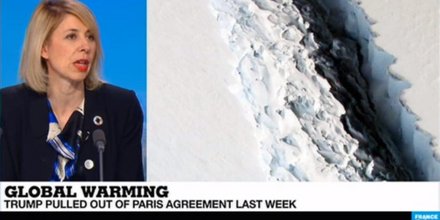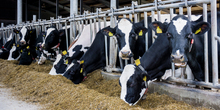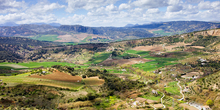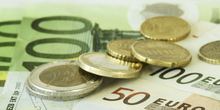Climate Change & Energy
Our Work
Latest in Climate Change & Energy
-

IEEP on France 24
Céline Charveriat discusses US withdrawal from Paris Accord and breaking Antarctic ice shelf.
-
The consequences of climate change for EU Agriculture: Follow up to the COP21 UN Climate Change conference
With its potential to reduce GHG emissions and increase CO2 removals, agriculture has a key role to play in the EU’s climate mitigation efforts, yet Member State action is lacking. As pressure on the sector to act increases, the development of a 2050 low-carbon and resilience roadmap for European agriculture would be one step towards putting the sector on a more ambitious trajectory towards the transformation required to achieve net zero emissions by 2050.
-
Agriculture and its role in meeting the EU’s climate commitments
Sector far from reaching its climate mitigation potential, with Member States placing more emphasis on climate adaptation
-
What contributions can agricultural emissions make to the proposed Effort Sharing Regulation?
New IEEP report finds the agriculture sector can significantly contribute to the EU’s climate commitments by reducing its non-CO2 emissions. It also finds these contributions can be delivered cost efficiently with environmental co-benefits without impacting production.
-
Towards sustainability: Future policies for European livestock
The CAP is failing to reward adequately those livestock farmers who produce public goods. Brexit and CAP reform are opportunities to do better.
-
Greening taxes and subsidies in the Pacific
IEEP will share its expertise on environmental taxation and the reform of environmentally harmful subsidies at a forum event on greening taxation and subsidies in the Pacific region during the IUCN World Conservation Congress in Hawaii.
-
Land suitability assessments for bioenergy feedstocks in the EU – a review of data sources
Current data availability is inadequate to undertake a detailed national or European level study of land areas that are underutilised and could be considered available for bioenergy production within the EU.
-
New report launch: Call for a new vision for responsible renewable energy with a clear European dimension
Claude Turmes MEP hosted an event launching both IEEP’s report and a debate on the future of renewable energy in Europe. In the our report IEEP present how a resource efficient energy system might be delivered in a way that minimises impact on biodiversity and the wider environment.
-
A New Vision for Responsible Renewable Energy with a Clear European Dimension
Renewable energy is key to the decarbonisation of Europe’s energy supply, however, the scale of expansion needed will have significant impacts over a considerable area. This new report suggests how a resource efficient energy system might be delivered in a way that minimises and mitigates impacts on biodiversity and the wider environment.
-
New report: delivering low carbon transport fuels post 2020
How should EU policy support the transition to low carbon transport fuels post 2020? A new IEEP led report argues that future policies should be differentiated to tailor support towards specific objectives and technologies that offer the greatest potential for a low carbon future.
-
New report is out: delivering low carbon transport fuels post 2020
How should EU policy support the transition to low carbon transport fuels post 2020? A new IEEP led report argues that future policies should be differentiated to tailor support towards specific objectives and technologies that offer the greatest potential for a low carbon future.
-
Looking beyond Paris
The latest edition of IEEP's newsletter is now available. David Baldock argues that in the next six months the EU has a substantive role in contributing to agreement on an ambitious but credible set of SDGs and more stretching climate targets. Also: energy efficiency and security; bioeconomy; and circular economy.
-
Conclusion on ILUC in sight
After five years of discussion, a landmark moment has been reached whereby the indirect land use change (ILUC) impacts of biofuels almost certainly will be addressed in EU law.
-
Building a high value bioeconomy in the UK: opportunities from waste
The UK is exploring opportunities to develop a high value bioeconomy based initially on waste. IEEP is helping to identify international best practice examples in order to maximise the environmental and economic benefits of this new Government initiative.
-
Evidence before ideology
The latest edition of IEEP's newsletter is now available. David Baldock argues that in 2015 solid evidence rather than political fashion will be required in scrutinising EU policy and economic performance. Also: fossil fuel subsidies; allocating fishing quota; and the launch of our new training programme.
-
Estimating support for fossil fuel subsidies in the EU-28
New study by IVM, VITO, IEEP and BIO identifies and quantifies government support to fossil fuels in the EU-28. Significant support is provided through reduced excise taxes, with EU-wide tax expenditures estimated to be between EUR 28 billion and EUR 200 billion depending on the benchmark used.
-
Access IEEP’s definitive guide to European environmental policy
The award-winning Manual of European Environmental Policy is now available on IEEP’s website. This archive provides free access to the definitive guide to the development of European environmental policy.
-
Getting delivery right: the EU 2030 climate and energy targets and the challenge of governance
The EU’s commitment to GHG reductions of “at least” 40% by 2030 are a useful contribution to international climate negotiations. But does the package of energy targets offered by the European Council at the same time put us on the right track to long-term decarbonisation goals? IEEP’s Martin Nesbit offers a personal perspective on what needs to be done, and how the governance arrangements need to be tightened.
-
The Manual: Chapter 3 - Climate change
This is a chapter of IEEP’s Manual of European Environmental Policy. This chapter on EU climate change policy outlines the initial EU programme to stabilise CO2 emissions in the EU with explanations of the directives, decisions and legislation that were employed to improve energy efficiency and reduce emissions.
-
The Manual: Front pages
This is a chapter of IEEP’s Manual of European Environmental Policy. This chapter provides information on the authors, editors and editorial board involved in the Manual, as well as guidance on how to use it, and a brief outline of its content.
Related
-

Developing a sustainable future for biofuels
Disseminating knowledge and informing the debate around the future of biofuel policy in the EU.
Highlights
-

The consequences of climate change for EU Agriculture: Follow up to the COP21 UN Climate Change conference
With its potential to reduce GHG emissions and increase CO2 removals, agriculture has a key role to play in the EU’s climate mitigation efforts, yet Member State action is lacking. As pressure on the sector to act increases, the development of a 2050 low-carbon and resilience roadmap for European agriculture would be one step towards putting the sector on a more ambitious trajectory towards the transformation required to achieve net zero emissions by 2050.
-

What contributions can agricultural emissions make to the proposed Effort Sharing Regulation?
New IEEP report finds the agriculture sector can significantly contribute to the EU’s climate commitments by reducing its non-CO2 emissions. It also finds these contributions can be delivered cost efficiently with environmental co-benefits without impacting production.
-

Land suitability assessments for bioenergy feedstocks in the EU – a review of data sources
-

A New Vision for Responsible Renewable Energy with a Clear European Dimension
-

Re-examining EU biofuels policy: A 2030 perspective
-

Does the EU benefit the UK environment?
-

Mainstreaming climate in EU funds - the progress to date
